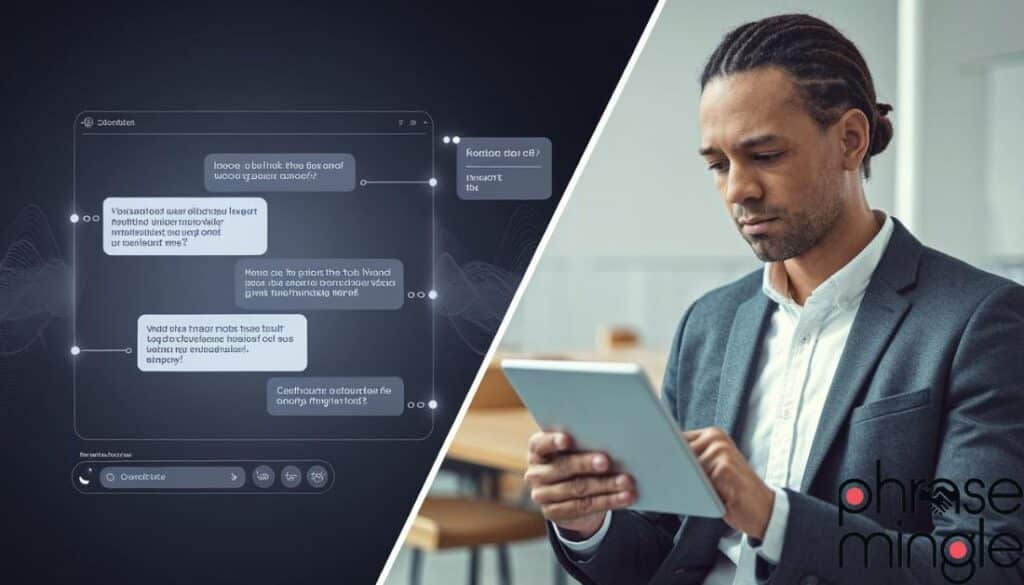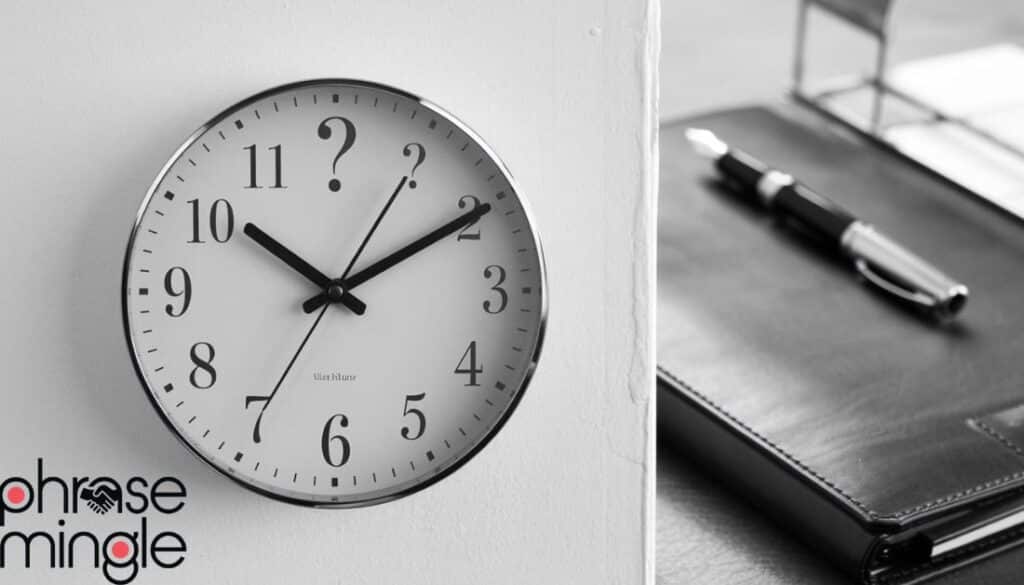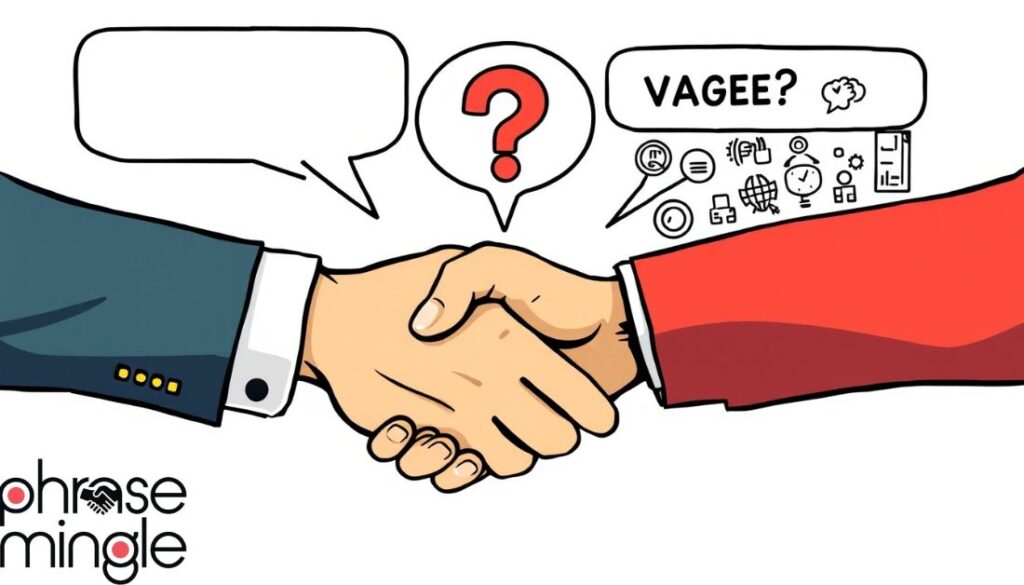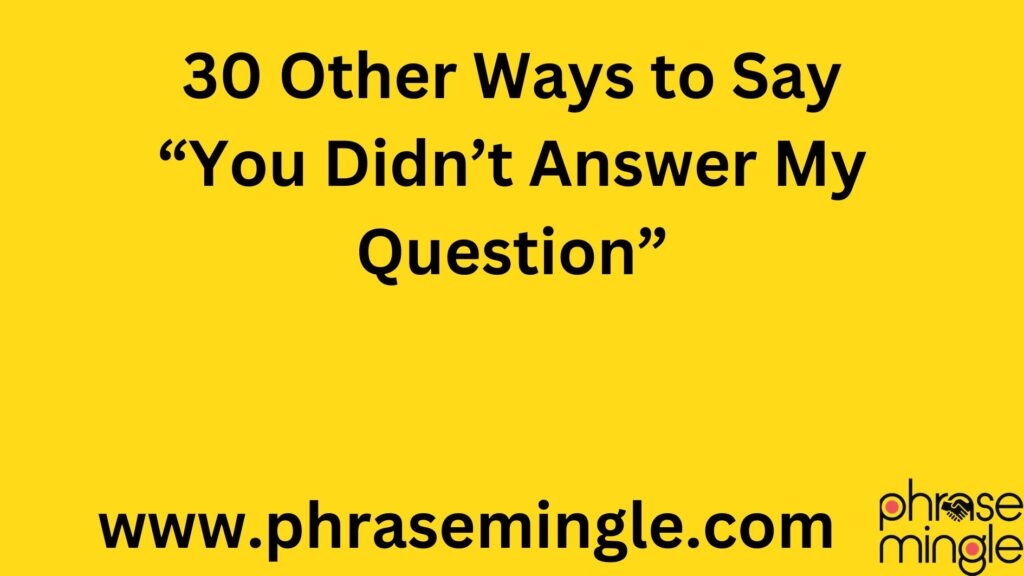In the intricate dance of conversation, we’ve all experienced moments when our questions go unanswered. Whether in professional settings, personal relationships, or casual interactions, the frustration of an overlooked inquiry can be palpable. But fear not when faced with the dilemma of “You Didn’t Answer My Question,” there are tactful ways to address the situation without escalating tension.
This comprehensive guide will equip you with 30 ingenious alternatives to the blunt statement, “You didn’t answer my question.” We’ll explore tactful, engaging, and effective ways to steer conversations back on track, ensuring your voice is heard and your queries addressed.
Why Effective Questioning Matters

Before we check into our arsenal of phrases, let’s consider why mastering this skill is crucial:
- Clarity: Clear communication prevents misunderstandings and saves time.
- Respect: Tactful persistence shows respect for both parties in the conversation.
- Efficiency: Getting direct answers leads to more productive discussions.
- Relationship Building: Handling these situations well can strengthen professional and personal bonds.
Now, let’s explore the myriad ways to gracefully point out that your question remains unanswered.
Direct Yet Tactful Approaches

Sometimes, the most effective route is a straightforward one. These phrases maintain clarity while avoiding confrontation.
1.”I’m afraid my question hasn’t been addressed yet.”
- Example: In a team meeting, you ask about project deadlines, but the discussion veers off-topic.
- Explanation: This phrase gently reminds the speaker of the unanswered question without placing blame.
2.”Could we circle back to my initial inquiry?”
- Example: During a customer service call, your main concern is overlooked as the representative offers unrelated information.
- Explanation: This politely suggests returning to the original topic without dismissing the current conversation.
3.“I’m still curious about the answer to my original question.”
- Example: In a classroom setting, a teacher’s explanation doesn’t quite hit the mark of your initial query.
- Explanation: This shows continued interest and subtly indicates that the current answer isn’t sufficient.
4.“It seems we’ve drifted from my primary concern.”
- Example: In a negotiation, the other party keeps focusing on minor details, ignoring your main point.
- Explanation: This tactfully acknowledges the conversation’s shift and expresses a desire to refocus.
5.“I’d love to hear your thoughts on what I asked earlier.”
- Example: During a job interview, the interviewer’s response doesn’t quite address your question about company culture.
- Explanation: This phrase invites the speaker to specifically address your previous inquiry in a non-confrontational way.
If You Read More Related This Click Here
Inquisitive and Engaging Prompts

These phrases frame the situation as a mutual oversight, encouraging cooperation in addressing the unanswered question.
6.“Did my question get lost in the shuffle?”
- Example: In a busy email thread, your specific query about budget allocations is overlooked.
- Explanation: This lighthearted approach acknowledges the possibility of unintentional oversight in a busy context.
7.”I wonder if we could revisit my earlier point?”
- Example: During a brainstorming session, your idea about marketing strategies is quickly passed over.
- Explanation: This gentle prompt suggests returning to a previously mentioned topic without demanding immediate attention.
8.“How does your response relate to my initial question?”
- Example: In a political debate, a candidate’s answer seems to dodge your question about specific policy plans.
- Explanation: This encourages the speaker to draw a clear connection between their response and your original inquiry.
9.”Could you clarify how this addresses my original concern?”
- Example: A financial advisor’s explanation doesn’t quite answer your question about long-term investment strategies.
- Explanation: This politely requests a more direct link between the given information and your specific query.
10. “I’m intrigued to know your perspective on my first query.”
- Example: In a philosophical discussion, your question about ethical dilemmas is sidestepped for easier topics.
- Explanation: This shows continued interest while gently reminding the speaker of the unanswered question.
Light-hearted and Humorous Nudges

A touch of humor can often diffuse tension and make your point more memorable.
11. “Looks like my question’s playing hide and seek!”
- Example: In a casual conversation with friends, your question about weekend plans gets buried under jokes and tangents.
- Explanation: This playful approach draws attention to the overlooked question without creating awkwardness.
12. “Is my inquiry too shy to come out and play?”
- Example: During a family dinner, your question about an upcoming reunion is lost in the general chatter.
- Explanation: This whimsical personification of the question can lighten the mood while making your point.
13. “Did my question take an unexpected detour?”
- Example: In a product demonstration, the presenter keeps focusing on features unrelated to your specific inquiry.
- Explanation: This humorously acknowledges the conversation’s drift while hinting at a desire to return to the original topic.
14. “I think my question’s feeling a bit neglected.”
- Example: In a group chat, your question about meeting logistics is buried under a flood of unrelated messages.
- Explanation: This adds a touch of whimsy while gently reminding others of your unanswered query.
15. “Are we in a game of ‘Dodge the Question’?”
- Example: During a Q&A session, a speaker consistently avoids directly answering audience inquiries.
- Explanation: This playful challenge can address a pattern of evasion while maintaining a light tone.
If You Read More Related This Click Here
Polite and Professional Reminders

In formal settings, these phrases maintain decorum while assertively seeking answers.
16. “I apologize, but I don’t believe my question was fully addressed.”
- Example: In a board meeting, your query about quarterly projections receives a vague, generalized response.
- Explanation: This polite phrasing acknowledges the possibility of misunderstanding while firmly requesting clarification.
17. “Would you mind if we revisited my earlier inquiry?”
- Example: During a client consultation, your specific question about service packages is glossed over.
Explanation: This respectful request gives the other party an opportunity to voluntarily return to the topic.
18. “I’m still seeking clarity on my previous question.”
- Example: In a legal consultation, your question about specific contract terms receives a general explanation of contract law.
- Explanation: This phrase indicates ongoing confusion and politely requests further elaboration.
19. “Perhaps we could take another look at my initial concern?”
- Example: In a performance review, your question about specific improvement areas is met with general praise.
- Explanation: This suggests revisiting a topic without directly stating that it wasn’t addressed adequately.
20. “I’d appreciate your insights on my original question.”
- Example: During a medical consultation, your specific question about treatment side effects is overlooked in favor of general health advice.
- Explanation: This politely expresses continued interest in a specific topic that may have been unintentionally ignored.
Assertive Yet Respectful Statements

These phrases more directly address the issue while maintaining a professional tone.
21. “I notice we’ve moved away from my primary question.”
- Example: In a strategy meeting, the discussion drifts to minor details, leaving your main question about overall direction unanswered.
- Explanation: This observation gently steers the conversation back to the main point without accusation.
22. “My original inquiry remains unanswered.”
- Example: In a customer support chat, your specific question about product compatibility is lost in general troubleshooting advice.
- Explanation: This direct statement clearly communicates that a question is still pending without being confrontational.
23. “I’d like to steer us back to the heart of my question.”
- Example: During a town hall meeting, a politician’s response veers off into unrelated policy areas, ignoring your specific concern.
- Explanation: This assertively refocuses the discussion while maintaining a respectful tone.
24. “The core of my question hasn’t been addressed yet.”
- Example: In a technical workshop, your question about advanced features is met with basic information you already know.
- Explanation: This clearly states that the current information doesn’t satisfy your inquiry, inviting a more targeted response.
25. “The core of my question hasn’t been addressed yet.”
- Example: In an email chain, your specific question about project timelines is buried under discussions of minor details.
- Explanation: This politely but firmly reminds others that an answer is still expected.
If You Read More Related This Click Here
Gentle Probes and Clarifications

These approaches invite the other party to elaborate, potentially leading to the answer you seek.
26. “I may not have expressed my question clearly. Could I rephrase it?”
- Example: In a complex scientific discussion, your question about specific methodologies receives a general overview of the field.
- Explanation: This takes responsibility for potential miscommunication while offering a chance to clarify.
27. “How does your answer connect to what I originally asked?”
- Example: In a philosophical debate, a respondent’s answer seems tangentially related to your specific ethical query.
- Explanation: This invites the speaker to draw explicit connections between their response and your question.
28. “I’m trying to understand how this relates to my question.”
- Example: During a product demo, the presenter’s features explanation doesn’t address your specific use case inquiry.
- Explanation: This expresses a genuine attempt to connect the given information with your original concern.
29. “Could you help me see the link between your response and my inquiry?”
- Example: In a business negotiation, the other party’s proposal doesn’t seem to address your main concerns about partnership terms.
- Explanation: This politely asks for explicit clarification on how the provided information answers your question.
30. “I’m curious about how this information applies to my initial concern.”
- Example: In a career counseling session, general advice about the job market doesn’t address your specific question about transitioning industries.
- Explanation: This shows interest in the provided information while gently reminding about the original, unanswered query.
Conclusion: Mastering the Art of Persistent Inquiry
By using these 30 Other Ways to Say “You Didn’t Answer My Question,” you’re not just seeking information you’re fostering clearer, more productive dialogues.
Balancing assertiveness with respect is key in professional, academic, and personal interactions. Practice these techniques to make your conversations more focused and satisfying.
Next time you encounter an unanswered question, don’t hesitate to circle back or clarify. With these tools, you’re ready to navigate communication challenges and gain the clarity you seek.

Jamze Hope,
I am a writer at Phrase Mingle, where i shares insightful phrase guides to help readers enhance their language skills. With a passion for words and clear communication, Jamze creates engaging content that simplifies complex expressions, making them accessible to all.







